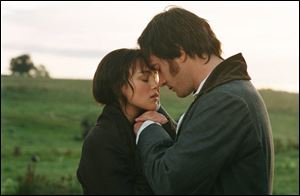
Movie review: Pride & Prejudice ****
11/23/2005
Keira Knightley and Matthew MacFadyen portray Jane Austen s famous Pride & Prejudice couple Elizabeth Bennet and Mr. Darcy on whom countless romantic works are based.
Mr. Darcy has a mullet.
There, I've said it.
Sorry, English majors and Jane Austen purists, but there it is. Mr. Darcy, the stodgy, repressed male half of Western literature's most ubiquitous, most adapted, most familiar, and most influential romantic pair, is all business in the front, with a party in back.
Hairdo-wise, of course.
And to some extent, that's a fairly accurate metaphor for Joe Wright's deceptively staid, but rebellious and vigorous new version of Austen's Pride & Prejudice, co-starring a radiant, jaw-jutting Keira Knightley as that more sarcastic, fiery half of the famous couple - famous for their mutual love masquerading as mutual hate, and the basis for every romantic comedy, chick flick, and work of chick lit ever created, then, now, and forever.
"I'm bound to loathe him for all eternity," she says. And then he comes back with, um, "Do you expect me to rejoice in the inferiority of your circumstances?"
That's hot. Get a room, kids!
You've had 200 years already!
Then again, Elizabeth Bennet (Knightley), a girl of more wit than means, has had "Get a room" muttered to her more often than any lady in history - so familiar are adaptations of Austen's beloved novel, published in 1813. So routine are new adaptations of Austen's novels in general, about misunderstanding, respect, and romance too burdened by class and pride to recognize itself. (One could argue, all of her books have the same story, twisted into various combinations.) And yet Wright, a 33-year-old British TV director who makes his film debut here, pulls off a feat: He reminds us, even convinces us, why we need another Pride & Prejudice in the first place - and be honest, that is what you are wondering.
That, and whether or not the new Mr. Darcy (Matthew MacFadyen, he of the "You-smell-that-too?" look) is as good as Colin Firth's Darcy from the 1995 BBC miniseries, the one true P&P, so say Austen devotees. Well, like I would know. I mean, seriously. Come now. Why would I watch a five-hour Pride & Prejudice, hanging on every distant stare of longing and regret? I was burned out on Merchant Ivory, drawing rooms, minuets, and things-left-unspoken sometime around the fall of the Berlin Wall and the cancellation of Who's the Boss?
An educated guess?
Firth was better, and a female Austen-head I know well (to whom I once gave a custom T-shirt making fun of Austen, but misspelled it "Austin") would agree with that. MacFadyen starts out boorish, graduates to barely human; he's meant to be surly, though it's tough seeing what Liz warms to.
Still, I've got to say, Wright's Pride & Prejudice, for a picture full of things left unspoken and drawing rooms, does just about everything else right - meaning, it'll surprise those who think we have a perfectly acceptable 1940 version with Greer Garson and Laurence Olivier (the only previous big-screen version, incredibly, and not very good); and it'll drive the purists nuts with anger.
No longer, for instance, are we in polite, rigid English society. The startled look on Lizzie's face when she first steps foot in Darcy's mansion suggests the Bennet clan (really, more a chatter-box tribe, with Donald Sutherland and Brenda Blethyn giving brash, zero-pretension performances as their parents) has no experience with wealth, but knows how to irritate it.
Hence, Darcy's attraction.
Wright makes the late 18th century swirling and loud and alive. He sets a great deal of scenes in the book outdoors, taking advantage of the rolling meadows of rural England.
Indoors, meanwhile, he packs every corner of the frame with high-stepping clogs and the parlor alliances and trysts and group dances you've seen in a million films before - only this time, whatever is stately about these people (and this film) is on the surface. It keeps up appearances but knows how to have fun. Until Wright comes to Darcy, as stiff as he appears, ripe for an Austen heroine to come along and puncture his upper-class snobbery with cleverness.
Yet cleverness has a way of revealing the emotions it means to bury. Wright's centerpiece is a long, unbroken shot (perhaps five minutes long) of the Bennet girls (each pairing off, or shooting eyes at soldiers) arriving at a ball. The camera listens in on one snippet of conversation, finds a corner where a bit of drama is occurring, gets bored with that, takes a spin around the dance floor, then pops out to prowl the rooms of the mansion.
What I'm saying is, rather than filming a book, Wright made a movie - paring large sections out to give Austen a two-hour shape, but retaining the good stuff. Failure to do that enough, I think, is why the austere Merchant Ivory genre faded from taste recently. It's not that the audience is less literary now; the same audience will turn out here. It's that filmmaking of classic lit is either wildly radical (Clueless) or too intimidated by the material to be expressive (Vanity Fair); you would think all England keeps its upper lip stiff.
Which is why Knightley makes an ideal Elizabeth - assured, headstrong, she is the superhero of literature we had in our heads. Boy, this woman commands a room. Previously known for extravaganzas like Pirates of the Caribbean, she does not disappoint in headier surroundings, but reminds us intelligence can be as much in the eyes as on the tongue, and Knightley combines enough of both to be the "studier of character" Darcy admires. In the process, Knightley does for costume drama what Jane Austen did for popular literature.
She loosens its corset.
Contact Christopher Borrelli at: cborrelli@theblade.com
or 419-724-6117.